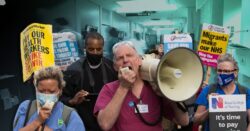Around 300,000 nurses are set to strike in the coming weeks, which could last up to six months (Picture: PA)
A map has revealed the hospital trusts where more than 300,000 nurses and doctors will strike, in action which could last six months.
NHS staff voted in favour of industrial action yesterday and now crisis talks between the Government and the union behind the strike have begun today.
The map shows the hospital trusts where walkouts are planned during the upcoming strikes.
It highlights the 176 NHS organisations across the UK that voted in favour of the strikes – which are the first in the union’s 106-year history.
Many of the biggest hospitals in England will see strike action by RCN members, including Guys and St Thomas’ in London, near the House of Commons.
The map shows the 176 NHS organisations that voted in favour of strike action (Picture: Metro.co.uk)
Nurses voted in favour of striking for the first time in 106 years (Picture: James Chapelard)
MORE : Nurses to hold biggest ever strike across UK within weeks
MORE : ‘Medical cannabis has saved my son from daily seizures – the NHS needs to be prescribing it’
MORE : Dozens of babies died or suffered brain damage unnecessarily at NHS trust
The strikes are set to begin within a few weeks, possibly before Christmas and the mandate to organise strikes runs until early May 2023, six months after members finished voting.
Exactly what the strikes will mean is yet to be determined, but patients will likely face disruption to operations and appointments amid record NHS waiting lists.
Department of Health bosses have refused to reveal what was discussed at the meeting, instead pointing only to a tweet Mr Barclay sent after the meeting which merely described the talks as ‘constructive’.
The Health and Social Care secretary said today: ‘Constructive meeting with the RCN covering a number of topics.
‘Nurses do an incredible job & I regret some union members have voted for strikes.
‘My priority is to keep patients safe and minimise disruption – my door is open & we have agreed to meet again shortly.’
RCN general secretary Pat Cullen stayed tight-lipped about the potential nurses’ strike after she left a meeting with Health Secretary Steve Barclay in Whitehall.
Ms Cullen was asked by waiting press about how the talks had gone, if Mr Barclay had been receptive and whether a strike could be averted.
Ms Cullen said nothing as she stepped out of the health department building and into the back seat of a chauffeured car after 1pm.
Pat Cullen, the head of the Royal College of Nurses (RCN) spoke with the health secretary earlier today (Credits: PA)
Health Secretary Steve Barclay has tried to avert strike action in a row over pay (Picture: PA)
MORE : NHS facing tougher challenges now than when Covid-19 hit, warns boss
MORE : Hundreds of thousands of nurses vote to go on strike for the first time
Dozens of hospitals will be affected by the walk-outs, with a ‘bank holiday service’ threatening to pile further misery on an already-crippled NHS.
Matthew Taylor, chief executive of the NHS Confederation, which represents most NHS organisations, said there are national and regional plans to minimise the impact on patients, but admitted operations and appointments will have to be cancelled or postponed.
Mr Barclay was said be to willing to discuss how working conditions can be improved but was ‘not negotiating’ on pay, as nurses demand a raise of at least 15%.
Mr Taylor warned that industrial action will be ‘a challenge’ for both the health service and NHS leaders.
He said: ‘We’re already coping with the gap that exists between the demand that is currently on the health service from the public. We’ve got to meet that demand, and we all know that we are heading into what already is a very difficult winter.
‘Then we add industrial action into that and it’s going to be an extremely difficult job.
‘The priority will be to try to minimise patient harm.’
He said the RCN has promised to maintain emergency and critical care ‘but there will be an impact if there is industrial action in terms of cancelled appointments, cancelled procedures, and NHS leaders will do everything we can to minimise that and to ensure that patients are kept informed of what is happening.’
More: News
Asked about the current state of nursing in the NHS, Mr Taylor said: ‘We are acutely aware of the fact that health workers take industrial action as a last resort – it’s very rare.
He said the issue is primarily about pay but ‘it’s important to understand that, whenever you speak to nurses, they will say pay is part of the challenge but it’s also about workload, about the fact that there are nearly 50,000 nurse vacancies across the NHS.
‘Even if there wasn’t any industrial action, we would still have a really big issue about how we recruit, how we retain and how we motivate staff in the NHS.’
Nurses are fighting for an inflation-busting pay rise of around 17 per cent, the equivalent of around £6,000 for an average nurse who earns £35,000.
Ministers have refused to meet the RCN’s demand, warning it would effectively cost the taxpayer £9 billion, which ‘in the current climate is simply not deliverable’.
Mr Barclay last night said the union was ‘out of step’ with the UK’s economic situation and the request was not ‘reasonable or affordable’.
In total, 176 NHS organisations across the UK voted in favour of strikes, out of a total of 311 employers included in the ballot. Some did not meet the 50 per cent turnout threshold.
Get in touch with our news team by emailing us at [email protected].
For more stories like this, check our news page.
The map shows which areas of the UK will be hit heaviest by the nurse strikes which could last up to six months





